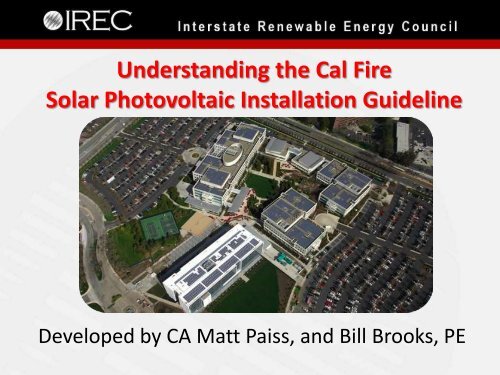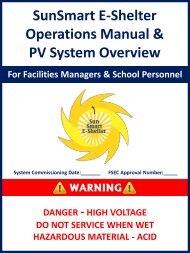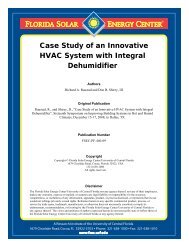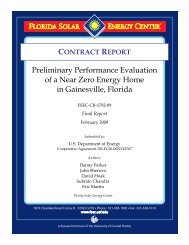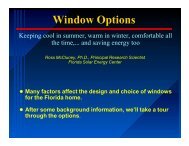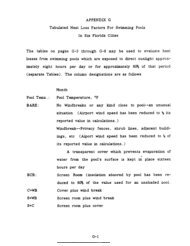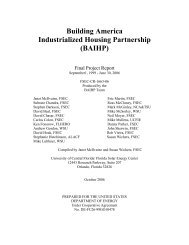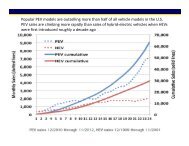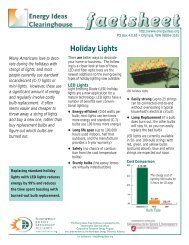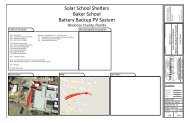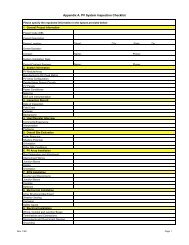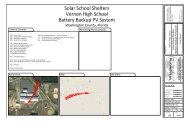Solar Photovoltaic Safety for Firefighters
Solar Photovoltaic Safety for Firefighters
Solar Photovoltaic Safety for Firefighters
You also want an ePaper? Increase the reach of your titles
YUMPU automatically turns print PDFs into web optimized ePapers that Google loves.
Understanding the Cal Fire<br />
<strong>Solar</strong> <strong>Photovoltaic</strong> Installation Guideline<br />
Developed by CA Matt Paiss, and Bill Brooks, PE
Presentation Overview<br />
• Brief Overview of History of PV Firefighter Issues<br />
• State Fire Marshal/CalSEIA Guideline Process<br />
• Specifics of the Guidelines<br />
– What is not included and why<br />
– What is included and why<br />
• National regulation coming in 2012<br />
• Questions??
Brief Overview of History of<br />
PV Firefighter Issues
History Lesson<br />
� Firefighter concerns are not new, but the level of<br />
awareness has greatly increased recently.<br />
� In 1998, fire officials in Northern Cali<strong>for</strong>nia suggested a<br />
variety of very stringent regulations <strong>for</strong> PV systems.<br />
Largely ignored and the issues went away (<strong>for</strong> a period<br />
of time)<br />
� CalSEIA (Cali<strong>for</strong>nia <strong>Solar</strong> Industries Association) and<br />
SMUD (Sacramento Municipal Utilities District)<br />
developed training materials <strong>for</strong> fire fighters in 2006.<br />
� These training materials raised awareness among fire<br />
districts in Cali<strong>for</strong>nia and elsewhere.<br />
� LA Fire Department began strictly en<strong>for</strong>cing a<br />
document that was developed in 1999. They also<br />
added new requirements to the document.
The LA PV Installation Guidelines<br />
• The LA Guidelines began to be more strictly<br />
en<strong>for</strong>ced in the spring of 2007 after the fire<br />
department updated the document.<br />
• Previous guidelines were only used <strong>for</strong><br />
commercial PV systems—now being applied to<br />
residential.<br />
• Main concerns related to language referring to:<br />
– 1) 4’ perimeter around arrays<br />
– 2) 50’x50’ maximum array sizes<br />
– 3) Reference to quick-release mounting<br />
hardware
How the State Guideline Process Started<br />
• Many installation permits began being held up<br />
due to concerns over compliance with LA<br />
guidelines.<br />
• <strong>Solar</strong> industry began voicing concerns to CalSEIA<br />
and the state fire marshal about delays.<br />
• State Fire Marshal convened first meeting on<br />
August 17, 2007—approximately 20<br />
participants—roughly half fire officials and half<br />
solar representatives.
Fire Service Contributors<br />
• Vickie Sakamoto, CAL FIRE-OSFM<br />
• Kevin Reinertson, CAL FIRE-OSFM<br />
• Matthew Gatewood, Los Angeles Fire Department<br />
• Denise Enea and Marshall Hird, Woodside Fire Department<br />
• Jim Hone, Santa Monica Fire Department<br />
• Kent Miller, Port of Stockton<br />
• Ken Kwong and Elizabeth Brueck, Sacramento Fire Department<br />
• Lisa Beaver, SMUD<br />
• Ron Keefer, Menlo Park Fire Department<br />
• Tim Ippolito, Roseville Fire Department<br />
• Wes Kitchel, Santa Rosa Fire Department<br />
• Scott Poster, County of Los Angeles Fire Department<br />
• Ed Hadfield, Coronado Fire Department<br />
• William Bigariani, San Francisco Fire Department
CalSEIA<br />
<strong>Solar</strong> and “other” Contributors<br />
• Sue Kateley, CalSEIA<br />
• Gary Gerber, Sun Light & Power<br />
• Edgar Becerra, Sharp <strong>Solar</strong><br />
• Colin Murchie, SunEdison<br />
• John Hostetter, REC <strong>Solar</strong>, Inc.<br />
• Mark Mrohs, Kurt Johnson, Gary Neate, Dylan Anderson, and Carl Lenox,<br />
SunPower<br />
• Peter Rive, <strong>Solar</strong>City<br />
• Kirk Uhler and Carl Woods, <strong>Solar</strong>Power, Inc.<br />
Additional Participants<br />
• Bill Brooks, Brooks Engineering<br />
• John Taeker, Underwriters Laboratories
Introduction to Fire Marshal<br />
Guidelines (4/22/08 FINAL DRAFT)<br />
• ―This guideline was developed with safety as the<br />
principal objective. The solar photovoltaic industry<br />
has been presented with certain limitations in roof<br />
installations due to firefighting suppression<br />
techniques. The intent of this guideline is to provide<br />
the solar photovoltaic industry with in<strong>for</strong>mation that<br />
will allow it to design, build, and install solar<br />
photovoltaic systems in a manner that meets the<br />
objectives of both the solar photovoltaic industry and<br />
the Fire Service.‖
1.0 MARKING (IFC 605.11.1)<br />
– Marking is needed to provide emergency responders with<br />
appropriate warning and guidance with respect to isolating<br />
the solar electric system. This can facilitate identifying<br />
energized electrical lines that connect the solar modules to the<br />
inverter, as these should not be cut when venting <strong>for</strong> smoke<br />
removal.<br />
– Materials used <strong>for</strong> marking should be weather resistant. Use<br />
UL 969 as standard to weather rating (UL listing of markings is<br />
not required).<br />
• Vinyl signs would need to meet UL969<br />
requirements while plastic and metal engraved<br />
signs do not need to meet the UL standard.
Examples of Plastic<br />
Engraved and Vinyl Signs
1.1 Main Service Disconnect (IFC 605.11.1.3)<br />
– For residential applications, the marking may be placed within<br />
the main service disconnect. If the main service disconnect is<br />
operable with the service panel closed, then the marking<br />
should be placed on the outside cover.<br />
– For commercial application, the marking should be placed<br />
adjacent to the main service disconnect in a location clearly<br />
visible from the location where the lever is operated.<br />
• Adhesive-fastened signs may be acceptable if<br />
properly adhered.<br />
• Jurisdictions that require mechanical fastened<br />
signs may necessitate mounting signs adjacent to<br />
equipment.
Summary of Fire Marshal Guidelines<br />
• MARKING (IFC 605.11.1 and 605.11.1.4)<br />
– Main Service Disconnect<br />
CAUTION: SOLAR ELECTRIC SYSTEM<br />
– dc conduit, raceways, enclosures, cable<br />
assemblies, and junction boxes. Every 10’, at<br />
every turn, above/below penetrations, and all<br />
dc combiner and junction boxes.<br />
CAUTION SOLAR CIRCUIT
Sign Requirements<br />
• MARKING CONTENT: CAUTION SOLAR CIRCUIT (NEC®<br />
and IFC uses “Warning: <strong>Photovoltaic</strong> Power Source)”<br />
• RED BACKGROUND,<br />
• WHITE LETTERING,<br />
• MINIMUM 3/8” LETTER HEIGHT,<br />
• ALL CAPITAL LETTERS,<br />
• ARIAL OR SIMILAR FONT, NON-BOLD,<br />
• REFLECTIVE, WEATHER RESISTANT MATERIAL (durable<br />
adhesive materials meet this requirement)
2.0 ACCESS, PATHWAYS AND SMOKE VENTILATION (IFC<br />
605.11.3)<br />
• Section 2.0 relates to fire departments that<br />
engage in vertical ventilation operations.<br />
• Some departments are beginning to limit vertical<br />
ventilation <strong>for</strong> lightweight construction.<br />
• Other buildings already have automatic roof<br />
vents making roof access unnecessary.<br />
• Metal and concrete decked buildings are rarely<br />
trenched, so access to vents and skylights is all<br />
that may be necessary.
Purpose of Section 2.0<br />
Access and spacing requirements should be<br />
observed in order to:<br />
• Ensure access to the roof<br />
• Provide pathways to specific areas of the roof<br />
• Provide <strong>for</strong> smoke ventilation opportunities area<br />
• Provide emergency egress from the roof
Exceptions to Section 2.0<br />
Local jurisdictions may create exceptions to this<br />
requirement where access, pathway or ventilation<br />
requirements are reduced due to:<br />
• Proximity and type of adjacent exposures<br />
• Alternative access opportunities (as from adjoining<br />
roofs)<br />
• Ground level access to the roof area in question
Exceptions to Section 2.0 (cont.)<br />
• Adequate ventilation opportunities beneath solar array<br />
(as with significantly elevated or widely-spaced arrays)<br />
• Adequate ventilation opportunities af<strong>for</strong>ded by module<br />
set back from other rooftop equipment (shading or<br />
structural constraints may leave significant areas open<br />
<strong>for</strong> ventilation near HVAC equipment, <strong>for</strong> example.)<br />
• Automatic ventilation device.<br />
• New technology, methods, or other innovations that<br />
ensure adequate fire department access, pathways and<br />
ventilation opportunities.
Roof Ventilation—Residential Roof Layouts<br />
Ventilation (IFC 605.11.3.2.4)<br />
• 3’ space along ridge of roof<br />
– Ridge setback based on enough room to make 2’ wide<br />
ventilation cut.<br />
– ASCE 7, Minimum Design Loads <strong>for</strong> Buildings, requires<br />
this setback in high wind locations (e.g. eastern<br />
seaboard)<br />
• No rooftop disconnect requirement. (see appendix)<br />
• Each roof face treated independently.<br />
• PV array and wiring is off limits to fire fighters.
Roof Access—Residential Hip Roof Layouts<br />
(IFC 605.11.3.2.1)<br />
• Single hip needs one 3’ pathway on array faces.<br />
• Pathway should be along a structurally strong<br />
location such as a load bearing wall.<br />
• IFC adds a statement that ladder locations cannot<br />
be in front of windows or doors and cannot conflict<br />
with tree limbs, wires, or signs.
Full Hip
Cross Gable Roof
Roof Access—Residential with Single Ridge<br />
(IFC 605.11.3.2.2)<br />
• Single ridge needs two 3’ pathways on array faces<br />
along edge of load bearing exterior wall.
Full Gable
Roof Access—Residential Hips and Valleys<br />
(IFC 605.11.3.2.3)<br />
• 1.5’ space on either side of a hip or valley.<br />
• PV array can go to the center of the hip or valley if<br />
the hip or valley is of equal length on adjacent<br />
faces and no modules are on the adjacent face.
Cross Gable with Valley
Access—Commercial (IFC 605.11.3.3.1)<br />
• Commercial flat roof with no roof dimension more<br />
than 250 feet—4’ space around perimeter wall.<br />
• Commercial flat roof with a roof dimension more<br />
than 250 feet—6’ space around perimeter wall.<br />
• No rooftop disconnect requirement <strong>for</strong> fire<br />
fighters.
Pathways and Ventilation—Commercial<br />
(IFC 605.11.3.3.2 & 605.11.3.3.3)<br />
• Minimum 4’ pathway on center access of building in<br />
both directions. A 4’ access to skylights, roof<br />
hatches, and fire standpipes shall be provided to<br />
the perimeter wall.<br />
• Commercial rooftop arrays shall be no greater than<br />
150 by 150 feet in distance in either axis.<br />
• Array off limits to fire fighters.
Commercial < 250’
Commercial > 250’
Commercial > 250’<br />
Vent openings every 20’
LOCATION OF DC CONDUCTORS<br />
(IFC 605.11.2)<br />
• Conduit, wiring systems, and raceways <strong>for</strong><br />
photovoltaic circuits should be located as close as<br />
possible to the ridge or hip or valley and from the<br />
hip or valley as directly as possible to an outside<br />
wall to reduce trip hazards and maximize<br />
ventilation opportunities.<br />
• The DC combiner boxes are to be located such<br />
that conduit runs are minimized in the pathways<br />
between arrays.
LOCATION OF DC CONDUCTORS<br />
(IFC 605.11.2)<br />
• To limit the hazard of cutting live conduit in venting<br />
operations, DC wiring should be run in metallic<br />
conduit or raceways when located within enclosed<br />
spaces in a building and should be run, to the<br />
maximum extent possible, along the bottom of<br />
load-bearing members.<br />
– Intent is to stay away from common ventilation<br />
locations near ridge. Staying under load-bearing<br />
members minimizes likelihood of saws cutting<br />
wiring system.
Commercial Systems:<br />
Difficult Access Example
Craig Allyn Rose Photography - Emergencyphoto.com<br />
CONCLUSION


